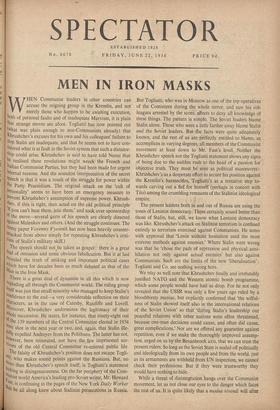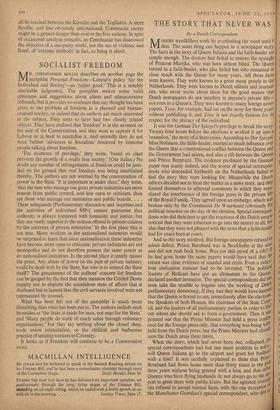MEN IN IRON MASKS
WHEN Communist leaders in other countries can accuse the reigning group in the Kremlin, and not merely those who happen to be awaiting execution, both of personal faults and of inadequate Marxism, it is plain that strange moves are afoot. Togliatti has now pointed out (What was plain enough to non-Communists already) that Khrushchev's excuses for his own and his colleagues' failure to stop Stalin are inadequate, and that he seems not to have con- sidered what is at fault in the Soviet system that such a dictator- ship could arise. Khrushchev is said to have told Nenni that be realised these revelations might wreck the French and Italian Communist Parties, but they had been made for urgent internal reasons. And the soundest interpretation of the secret speech is that it was a result of the struggle for power within the Party Praesidium. The original attack on the 'cult of Personality' seems to have been an emergency measure to Prevent Khrushchev's assumption of supreme power. Khrush- °ley. if this is right, then acted on the old political principle If you can't beat them, join them,' and took over sponsorship of the move—several parts of his speech are clearly directed against Malenkov and others. (And the struggle continues. The Army paper Voyenny Yyestnik has now been heavily counter- attacked from above simply for repeating Khrushchev's criti- cism of Stalin's military skill.) The speech should not be taken as gospel : there is a great (ical of omission and some obvious falsification. But it at last revealed the truth of striking and important political cases which have for decades been as much debated as that of the Man in the Iron Mask.
There is a great deal of dynamite in all this which is now exploding all through the Communist world. The ruling group Itself was just that small minority who managed to keep Stalin's eNidence to the end—a very considerable reflection on their characters, as in the case of Catesby, Ratcliffe and Lovell. Moreover, Khrushchev undermines the legitimacy of their Whole succession. He states, for instance, that ninety-eight out (if the 139 members of the Central Committee elected in 1934 Were shot in the next year or two, and, again, that Stalin ille- !411Y expelled Andreyev from the Politburo.few The latter has not, "Wever, been reinstated, nor have the imprisoned sur- vivors of the old Central Committee re-entered public life. The falsity of Khrushchev's position does not escape Togli- atti. who makes sound points against the Russians. But, no al°re than Khrushchev's speech itself, is Togliatti's statement lacking in disingenuousness. On the far periphery of the Com- munist world America's leading pro-Soviet writer, Mr. Howard ,i'ast, is confessing in the pages of the New York Daily Worker ' '441, he all along knew about Stalinist persecutions in Russia. But Togliatti, who was in Moscow as one of the top operatives of the Comintern during the whole terror, and saw his col- leagues arrested by the score, affects to deny all knowledge of these things. The pattern is simple. The Soviet leaders blame Stalin alone. Those who were a little 'farther away blame Stalin and the Soviet leaders. But the facts were quite adequately known, and the rest of , us are perfectly entitled to blame, as accomplices in varying degrees, all members of the Communist movement at least down to Mr. Fast's level. Neither the Khrushchev speech nor the Togliatti statement shows any signs of being due to the sudden rush to the head of a passion for objective truth. They must be seen as political manoeuvres : Khrushchev's as a desperate effort to secure his position against the Kremlin's barmecides, Togliatti's as a tentative step to- wards carving 'out a fief for himself (perhaps in concert with Tito) among the crumbling remnants of the Stalinist ideological empire.
The present leaders both in and out of Russia are using the tones of Leninist democracy. These certainly sound better than those of Stalin, but, still, we know what Leninist democracy was like. Khrushchev's attack on Stalinist terrorism is confined entirely to terrorism exercised against Communists. He notes with approval that 'Lenin without hesitation used the most extreme methods against enemies.' Where Stalin went wrong was that he 'chose the path of repression and physical ianni- hilation not only against actual enemies' but also against Communists. Such are the limits of the new `liberalisation': Togliatti and Co. see nothing wrong here.
We may as well note that Khrushchev finally and irrefutably justified NATO and the Western atomic bomb programme, which some people would have had us drop. For he not only revealed that the USSR was only a few years ago ruled by a bloodthirsty maniac, but explicitly confirmed that 'the wilful- ness of Stalin showed itself also in the international relations of the Soviet Union' so that 'during Stalin's leadership our peaceful relations with other nations were often threatened, because one-man decisions could cause, and often did cause, great complications.' Nor are we offered any guarantee against repetition, even if we make the thoroughly unproved assump- tion, urged on us by the Bevanbrook axis, that we can trust the present rulers. So long as the Soviet State is sealed off politically and ideologically from its own people and from the world, just as its armaments are withheld from UN inspection, we cannot check their professions. But if they were trustworthy they would have nothing to hide.
While a threat of disintegration hangs over the Communist movement, let us not close our eyes to the danger which faces the rest of us. It is quite likely that a modus vivendi will after all be reached between the Kremlin and the Togliattis. A more flexible, and less obviously anti-national, Communist enemy might be a greater danger than ever to the free nations. In spite of occasional anodyne remarks, no Communist has disavowed the objective of a one-party world, nor the use of violence and fraud, of 'extreme methods' in fact, to bring it about.



































 Previous page
Previous page